外研版英语七年级下册Module 2 名师总结:情态动词can的用法
情态动词can的用法总结归纳
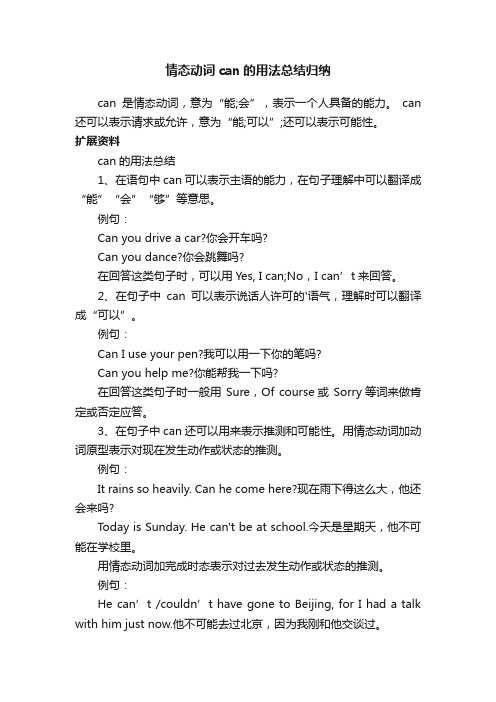
情态动词can的用法总结归纳can是情态动词,意为“能;会”,表示一个人具备的能力。
can 还可以表示请求或允许,意为“能;可以”;还可以表示可能性。
扩展资料can的用法总结1、在语句中can可以表示主语的能力,在句子理解中可以翻译成“能”“会”“够”等意思。
例句:Can you drive a car?你会开车吗?Can you dance?你会跳舞吗?在回答这类句子时,可以用Yes, I can;No,I can’t来回答。
2、在句子中can可以表示说话人许可的'语气,理解时可以翻译成“可以”。
例句:Can I use your pen?我可以用一下你的笔吗?Can you help me?你能帮我一下吗?在回答这类句子时一般用 Sure,Of course或 Sorry等词来做肯定或否定应答。
3、在句子中can还可以用来表示推测和可能性。
用情态动词加动词原型表示对现在发生动作或状态的推测。
例句:It rains so heavily. Can he come here?现在雨下得这么大,他还会来吗?Today is Sunday. He can't be at school.今天是星期天,他不可能在学校里。
用情态动词加完成时态表示对过去发生动作或状态的推测。
例句:He can’t /couldn’t have gone to Beijing, for I had a talk with him just now.他不可能去过北京,因为我刚和他交谈过。
She can’t /couldn’t have gone a broad yesterday.她不可能昨天就出国了。
(完整版)外研版七年级下册英语Module2Whatcanyoudo知识点及练习(有答案)
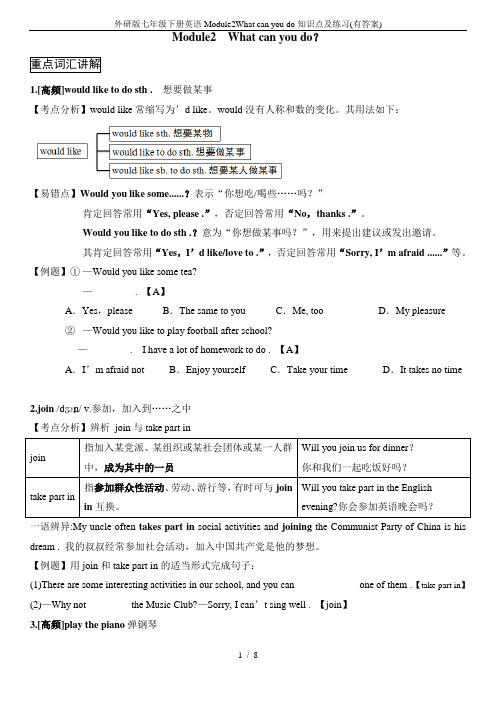
Module2 What can you do?重点词汇讲解1.[高频]would like to do sth .想要做某事【考点分析】would like常缩写为’d like。
would没有人称和数的变化。
其用法如下:【易错点】Would you like some......?表示“你想吃/喝些……吗?”肯定回答常用“Yes, please .”,否定回答常用“No,thanks .”。
Would you like to do sth .?意为“你想做某事吗?”,用来提出建议或发出邀请。
其肯定回答常用“Yes,I’d like/love to .”,否定回答常用“Sorry, I’m afraid ......”等。
【例题】①—Would you like some tea?—________ . 【A】A.Yes,please B.The same to you C.Me, too D.My pleasure②—Would you like to play football after school?—________ . I have a lot of homework to do . 【A】A.I’m afraid not B.Enjoy yourself C.Take your time D.It takes no time2.join /dʒɔɪn/ v.参加,加入到……之中【考点分析】辨析join与take part injoin指加入某党派、某组织或某社会团体或某一人群中,成为其中的一员Will you join us for dinner?你和我们一起吃饭好吗?take part in指参加群众性活动、劳动、游行等,有时可与joinin互换。
Will you take part in the Englishevening?你会参加英语晚会吗?一语辨异:My uncle often takes part in social activities and joining the Communist Party of China is his dream . 我的叔叔经常参加社会活动,加入中国共产党是他的梦想。
英语的情态动词can的用法

英语的情态动词can的用法在英语学习中,情态动词是一个重要的语法点,而“can”则是其中较为基础和常用的一个。
理解和正确使用“can”对于我们准确表达意思、进行有效的交流至关重要。
“can”最常见的意思是“能够;可以”,表示能力或可能性。
比如,“I can swim”(我会游泳。
)这里的“can”就表示“具备游泳的能力”。
再比如,“The door can be opened”(这扇门可以被打开。
)这里的“can”表示“有被打开的可能性”。
当我们谈论某人在某方面的能力时,“can”就派上了用场。
例如,“He can play the piano very well”(他钢琴弹得很好。
)“She can speak three languages”(她会说三种语言。
)在这些句子中,“can”清晰地传达了主语所拥有的具体能力。
“can”也用于表示许可。
比如,“You can go now”(你现在可以走了。
)“Can I use your pen?”(我可以用你的笔吗?)在这种情况下,“can”让我们知道某个行为是否被允许。
此外,“can”还能用来表示推测。
但需要注意的是,这种推测往往是基于一定的证据或经验,而非确凿的事实。
比如,“It can be very cold in winter here”(这里冬天可能会很冷。
)“The man can be the thief ”(那个男人可能是小偷。
)不过,在表示推测时,“could”和“may”有时也能表达相似的意思,但语气和可能性的程度会有所不同。
在否定句中,“can”变成“can't”,意思是“不能;不会;不可能”。
比如,“I can't sing”(我不会唱歌。
)“He can't be at home He just left”(他不可能在家。
他刚刚离开。
)在疑问句中,“can”要提前。
例如,“Can you help me?”(你能帮我吗?)“Can they come tomorrow?”(他们明天能来吗?)回答一般是“Yes, 主语+can”或者“No, 主语+can't”与其他情态动词相比,“can”的使用相对较为广泛和灵活。
情态动词CAN的用法总结

情态动词CAN的用法总结情态动词CAN是英语中一个非常重要的动词,它表示能力、可能性、请求或允许等多种含义。
下面是对CAN用法的总结:1. CAN表示能力CAN可以用来表示某人能够做某事,通常用于描述某种技能或能力。
例如:“I can swim.”(我会游泳。
)2. CAN表示可能性CAN也可以表示某种可能性或猜测。
例如:“It may rain tomorrow.”(明天可能会下雨。
)3. CAN表示请求或允许CAN可以用于请求某人做某事,或者表示允许某人做某事。
例如:“Can you help me with this task?”(你能帮我完成这个任务吗?)“Yes, I can.”(是的,我可以。
)4. CAN的疑问句形式CAN的疑问句形式是将CAN放在主语之前,例如:“Can you speak English?”(你会说英语吗?)5. CAN的否定形式CAN的否定形式是“cannot”,也可以缩写为“can't”。
例如:“I can't swim.”(我不会游泳。
)6. CAN的过去式用法CAN的过去式是“could”,表示过去的能力或可能性。
例如:“He could swim when he was young.”(他小时候会游泳。
)7. CAN与其他情态动词连用CAN可以与其他情态动词连用,例如“I could have done better.”(我本可以做得更好。
)其中,“could have done”表示过去可能发生的事情。
以上是对情态动词CAN的用法总结,希望对大家有所帮助。
(完整版)外研版七年级下册全部语法内容大汇总

外研版七年级下册全部语法内容大汇总一. 情态动词can的用法can+动词原形,它不随主语的人称和数而变化。
1. 含有can的肯定句:主语+can+谓语动词的原形+其他。
2. 含有can的否定句:主语+can't+动词的原形+其他。
3. 变一般疑问句时,把can提前:Can+主语+动词原形+其他?肯定回答:Yes,主语+can。
否定回答:No,主语+can't.4. 含有can的特殊疑问句:特殊疑问词+can+主语+动词原形+其他?I can speak English.→I can't speak English.→Can you speak English? →What can you speak?二. what time和when引导的特殊疑问句1. 询问钟点时用what time,询问日期、月份、年份时用when。
2. What's the time?=What time is it?现在几点了?3. 时刻表达法:顺读法和逆读法。
顺读法:“钟点+分钟”直接读数字。
如:7: 05 seven five;8:16 eight sixteen逆读法:借助介词past或to表示,要先说分再说钟点。
a. 当分钟不超过30分钟时(包括30分钟),即<或=30,用past表示。
其结构为:“分钟+past+整点”意为“几点过几分”。
如:1:25 twenty-five past oneb. 当超过30分钟时,即>30,用to表示。
其结构为:“所差分钟(即60—所过分钟数)+to+下一个整点”,to译成“差”,差几分钟到几点。
如:4:38 twenty-two to fivec. 当分钟为30分钟用half表示,当分钟为15分钟用a quarter。
三. how引导的特殊疑问句1. how 引导的特殊疑问句提问交通方式,其答语分三种情况:a. take a/an/the+交通工具(单数)b. by+交通工具(单数)c. on/in+限定词+交通工具---How do you go to school every day?---I take a bus to go to school every day./I go to school by bus every day./I go to school on t he bus every day.2. how far 用来提问距离,多远,其答语分为两种:(1)用长度单位表示:It is five kilometers.(2)用时间表示:It’s twenty minutes’walk.3. how long 用来提问时间,意为多久回答常用“for+段时”。
情态动词can有哪些用法
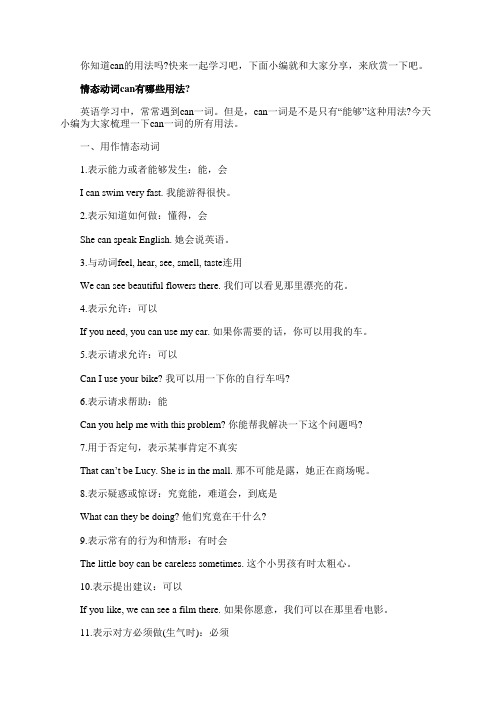
你知道can的用法吗?快来一起学习吧,下面小编就和大家分享,来欣赏一下吧。
情态动词can有哪些用法?英语学习中,常常遇到can一词。
但是,can一词是不是只有“能够”这种用法?今天小编为大家梳理一下can一词的所有用法。
一、用作情态动词1.表示能力或者能够发生:能,会I can swim very fast. 我能游得很快。
2.表示知道如何做:懂得,会She can speak English. 她会说英语。
3.与动词feel, hear, see, smell, taste连用We can see beautiful flowers there. 我们可以看见那里漂亮的花。
4.表示允许:可以If you need, you can use my car. 如果你需要的话,你可以用我的车。
5.表示请求允许:可以Can I use your bike? 我可以用一下你的自行车吗?6.表示请求帮助:能Can you help me with this problem? 你能帮我解决一下这个问题吗?7.用于否定句,表示某事肯定不真实That can’t be Lucy. She is in the mall. 那不可能是露,她正在商场呢。
8.表示疑惑或惊讶:究竟能,难道会,到底是What can they be doing? 他们究竟在干什么?9.表示常有的行为和情形:有时会The little boy can be careless sometimes. 这个小男孩有时太粗心。
10.表示提出建议:可以If you like, we can see a film there. 如果你愿意,我们可以在那里看电影。
11.表示对方必须做(生气时):必须You can shut up or get out. 你给我闭嘴,要不然就滚出去!二、用作名词1.金属罐: a can of beans 豆罐头2.一听:a can of Coke 一听可口可乐3.装运液体)金属容器、塑料容器:an oil can 油罐4.牢房,厕所: the can(只有单数形式)三、用作动词1.把(食品)装罐保存2.让…卷铺盖走人,炒…的鱿鱼在日常学习中,很少遇到can用作名词和动词用法,但我们要熟知其意义及其用法,做到熟练掌握,灵活运用!情态动词can的用法,绝对没你想象得那么简单!在英语学习中,情态动词是一个很重要的语法点,其中情态动词can的用法比较常见。
(完整版)情态动词can的基本用法
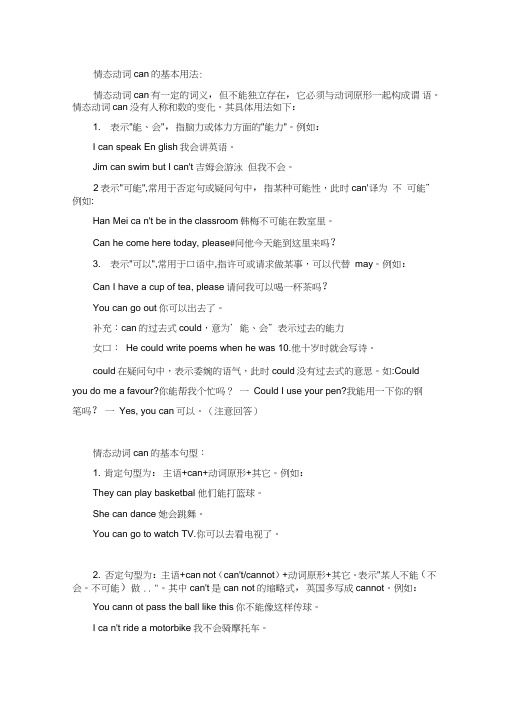
情态动词can的基本用法:情态动词can有一定的词义,但不能独立存在,它必须与动词原形一起构成谓语。
情态动词can没有人称和数的变化。
其具体用法如下:1. 表示"能、会",指脑力或体力方面的"能力"。
例如:I can speak En glish我会讲英语。
Jim can swim but I can't吉姆会游泳但我不会。
2表示"可能",常用于否定句或疑问句中,指某种可能性,此时can'译为不可能”例如:Han Mei ca n't be in the classroom韩梅不可能在教室里。
Can he come here today, please#问他今天能到这里来吗3. 表示"可以",常用于口语中,指许可或请求做某事,可以代替may。
例如:Can I have a cup of tea, please请问我可以喝一杯茶吗You can go out你可以出去了。
补充:can的过去式could,意为’能、会”表示过去的能力女口:He could write poems when he was 10.他十岁时就会写诗。
could在疑问句中,表示委婉的语气,此时could没有过去式的意思。
如:Couldyou do me a favour?你能帮我个忙吗?一Could I use your pen?我能用一下你的钢笔吗?一Yes, you can可以。
(注意回答)情态动词can的基本句型:1. 肯定句型为:主语+can+动词原形+其它。
例如:They can play basketbal 他们能打篮球。
She can dance她会跳舞。
You can go to watch TV.你可以去看电视了。
2. 否定句型为:主语+can not(can't/cannot)+动词原形+其它。
(完整word版)2013春外研版七年级下册Module2whatcanyoudo知识总结与归纳练习
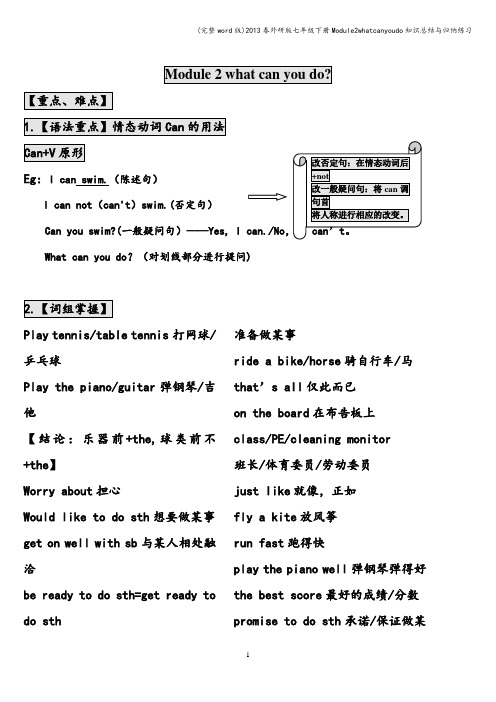
Eg: I can swim.(陈述句)I can not (can't )swim.(否定句)Can you swim?(一般疑问句)——Yes, I can./NoWhat can you do ?(对划线部分进行提问)Play tennis/table tennis 打网球/乒乓球Play the piano/guitar 弹钢琴/吉他【结论:乐器前+the,球类前不+the 】Worry about 担心Would like to do sth 想要做某事 get on well with sb 与某人相处融洽be ready to do sth=get ready to do sth准备做某事ride a bike/horse 骑自行车/马 that ’s all 仅此而已 on the board 在布告板上 class/PE/cleaning monitor 班长/体育委员/劳动委员 just like 就像,正如 fly a kite 放风筝 run fast 跑得快play the piano well 弹钢琴弹得好the best score 最好的成绩/分数 promise to do sth 承诺/保证做某事Food and Drink Club饮食俱乐部What/How about+Ving?…怎么样?Choose …。
as…选择…作为…Speak Chinese讲汉语Be good at =do well in 擅长…---What can you do?你会做什么?---I can play the piano。
我会弹钢琴。
1.【详解】意为“想要、愿意",其后+N/to do sth。
其中,would是情态动词,缩写为’d.如:Lucy would like some eggs.露茜想要一些鸡蛋。
肯定回答常用“Yes, please.”,否定回答常用“No, thanks。
七年级下册情态动词can知识点

七年级下册情态动词can知识点情态动词是英语中的一种特殊动词,用来表示说话者的态度、意向、能力、建议等情感或语气。
其中,can是最常用的情态动词之一,在日常英语交流中经常被使用。
本文将为大家讲解关于can的常见用法和一些需要注意的事项。
一、can的基本含义can表示“能、可以”,可用于各种语境中。
例如:1. 表示能力或技能:I can speak English fluently. (我能够流利地说英语。
)2. 表示许可或请求:Can I use your pen? (我能用你的笔吗?)3. 表示可能性:It can be difficult to learn a new language. (学一门新语言可能很难。
)4. 表示惯常的行为或能力:She can swim well. (她擅长游泳。
)二、can的否定式和疑问式can的否定式是“can’t”,疑问式是“can”。
例如:1. 否定式:I can’t play the guitar. (我不会弹吉他。
)2. 疑问式:Can you speak Chinese? (你会说中文吗?)三、can和be able to的区别虽然can和be able to都表示“能、可以”,但它们有些细微的区别。
be able to更偏重于表达一种实际的能力,而can则更多地表示情感意志。
例如:1. 我会游泳。
(I can swim.)2. 我经过训练,现在已经能游泳了。
(I am able to swim now after training.)四、can的注意事项1. can和cannot/can’t之间没有缩写形式。
2. can表示一种现在或者不确定的未来能力,而不能表示过去能力。
如果要表达过去的能力,需要用to be able to + 动词的过去分词形式。
例如:I can speak Spanish.(错误)I was able to speak Spanish when I was younger.(正确)3. 在对某人的行为进行评论时,不能用can to do,而要用be able to do。
02 情态动词-七年级英语(外研版)

情态动词can在本模块中,情态动词can意为“能;会”。
Can和实义动词构成“can+动词原形”的结构,意为“能做某事”。
Can没有人称和数的变化。
具体用法如下:1.can表示能力,意为“能;会”。
如:I can speak English.我会讲英语。
2.can表示可能性,意为“可能;会”。
如:He can't be in the room.他不可能在房间里。
3.can表示许可或请求,意为“可以”。
如:Can I have a look at your photo? 我可以看看你的照片吗?4.can在句中的应用(1)肯定句:主语+can+动词原形+其他.如:Tom can play the guitar.汤姆会弹吉他。
(2)否定句:主语+cannot/can't+动词原形+其他.如:You can't play computer games.你不能玩电脑游戏。
(3)一般疑问句:Can+主语+动词原形+其他?肯定回答:Yes,主语+can.否定回答:No,主语+can't.(4)特殊疑问句:特殊疑问词+can+主语+动词原形+其他?当特殊疑问词是句子的主语时则为“特殊疑问词+can+动词原形+其他?”。
如:What can you see in the room? 你在房间里能看见什么?Who can answer the question?谁能回答这个问题?情态动词练习及解析一、单项选择。
1. (中考.滨州)—Must I go to a law school and be a lawyer like you, Dad?—No, you _____. You are free to make your own decision.A.can'tB.mustn'tC.shouldn'tD.needn't2. If you have questions, you can _____ your hands without hesitation (犹豫).A.riseB.raiseC.rise upD.raise to3. —Can you _____ the phone for me? I'm taking a shower at the moment.—Of course.A.callB.talkC.answerD.listen4. This hall can _____ more than two thousand people.A.haveB.stayC.playD.hold5. Jack _____ be at home because there is no light in the house.A.can'tB.mustn'tC.canD.must6. They can _____ to get to Century Park.A.take undergroundB.take the undergroundC.by undergroundD.by the underground7. —Where are you going this winter holiday?—We _____ go to Japan, but we are not sure.A.mightB.mustC.can't8. —Excuse me, whose notebook is this?—It _____ be Bob's. I'm not sure.A.mustB.can'tC.might9. The text is available online so you _____ have a copy of it now.A.can'tB.shouldn'tC.needn'tD.mustn't10. I usually do my homework in the evening, but I _____ watch a TV programme this evening.A.mightB.shouldC.couldD.must11. —Did you see Jenny?—No, I didn't. She _____ be in the library, I guess.A.mightB.wouldC.couldD.need12. There's enough time for you to go to the airport. You _____ hurry now.A.shouldB.needn'tC.mustD.can't13. Lucy can _____ to the teacher carefully.A.listensB.listeningC.listen14. Lucy can _____ to the teacher carefully.A.listensB.listeningC.listen15. You have already tried your best, so you _____ worry about the matter.A.can'tB.needn'tC.mustn'tD.couldn't16. You should always _____ English and listen to the teachers carefully in class.A.speakB.to speakC.speakingD.speaks17. —Where's Jeff?—I'm not sure. He _____ be playing basketball on the playground.A.needB.mightC.must18. You should always _____ English and listen to the teachers carefully in class.A.speakB.to speakC.speakingD.speaks19. I hope she can _____ my uncle with me this week.A.visitB.visitingC.visitsD.visited20. He couldn't run fast or _____ basketball well.A.playsB.playC.played21. —What can she do for the party?—She can _____ English songs.A.singsB.singC.singing22. When you are angry, don't say anything, and you should _____ a deep breath.A.takeB.takingC.to take23. Don't be angry. You should _____ a deep breath.A.takesB.to takeC.take24. Can I also _____ his pen pal?A.beB.amC.is25. It's cold in January, and we should _____ inside and _____ films.A.stay, watchB.to stay, to watchC.stay, watches26. Lucy is a waitress (服务员). She must stand and _____ for an hour every morning.A.to smileB.smilesC.smile27. —Shall we _____ the ferry to the Sun Island?—Good idea!A.takeB.takingC.to take28. You can _____ my friend, too.A.areB.isC.be29. When we cross the road, we must _____ the traffic rules.A.to rememberB.rememberC.remembers30. We mustn't _____ the rubbish on the ground.A.throwB.to throwC.throwing31. In the USA people on bikes must _____ a helmet.A.wearB.to wearC.wearing32. Physics isn't very difficult. You _____ be afraid of it.A.mustn'tB.needn'tC.can'tD.won't33. People _____ smoke on an underground train.A.should notB.will notC.may notD.must not34. —Is that cap Bob's?—No, it _____ be his. His is blue.A.can'tB.mustn'tC.needn'tD.may not35. —Must I finish my homework before I go to the concert, Mum?—I'm afraid you _____.A.mustB.mustn'tC.needn'tD.may36. You don't have to take a bus, you may go there on foot. The underlined part means _____.A.needn'tB.can'tC.may notD.mustn't37. That _____ be true. I don't believe that.A.canB.can'tC.mustD.mustn't38. —Isn't that Ann's husband over there?—No, it _____ be him. He doesn't wear glasses.A.can'tB.mustn'tC.needn'tD.may39. The old _____ enjoy the convenience of technologies because they don't accept new things quickly.A.mustn'tB.needn'tC.can'tD.shouldn't40. —Listen! Is that Cindy singing in the next room?—It _____ be Cindy. She has gone to the library.A.can'tB.mustn'tC.needn'tD.may not41. —Is the boy over there Danny?—No. it _____ be him. He has gone to Shanghai for an English Speech Contest.A.mustB.can'tC.mustn'tD.shouldn't42. If time allows, we _____ take a walk along the view path and take some photos.A.canB.needC.mustD.ought43. _____ I use your bicycle? Mine is broken.A.CanB.MustC.NeedD.Should44. —How amazing this robot is!—Wow, it has video cameras in its eyes, so it _____ "see" and interact with people.A.mayB.canC.mustD.should45. Our monitor _____ be in the classroom now, for he was sent to hospital just now.A.mustn'tB.can'tC.shouldn'tD.needn't46. —_____ you sing an English song?—Yes, I can.A.CanB.MayC.MustD.Need47. —I saw your brother in the chess club just now.—It _____ be him. He is taking a competition in Beijing.A.mustB.couldC.mightD.can't48. Our English teacher _____ in her office now. I saw her talking with some students on the playground just a minute ago.A.mustn't beB.may not beC.needn't beD.can't be49. Steve is good at sports. He _____ play basketball and football, and run very fast.A.mustB.canC.shouldD.may50. Alice _____ swim, so she is afraid to jump into the river.A.canB.can'tC.mustD.mustn't51. —Will you stay here for dinner with us?—Sorry, I _____. My mother is waiting for me at home.A.mustn'tB.can'tC.needn'tD.couldn't52. —Lily, _____ you speak French?—Yes, I can.A.mustB.shouldC.needD.can53. —Look, here is a book under the chair. Whose book is it?—It _____ Sally's. I'm not sure.A.might beB.must beC.can't be54. —What will the weather be like tomorrow?—It _____ be rainy, cloudy or sunny. Who knows?A.mustB.mightC.shouldD.can't55. —Where is Susan?—She _____ go to the bank, but I'm not quite sure.A.mightB.mustC.can56. Life is changeable. No one knows what _____ happen in the future.A.shouldB.needC.have toD.might57. —I _____ tell them the truth.—But you must be honest.A.mustn'tB.shouldn'tC.daren'tD.needn't58. —Peter, where is your sister?—I don't know. She _____ go to the park.A.mustB.may beC.wouldD.might59. You _____ finish all the work today. You _____ finish some of them next week.A.mustn't, mayB.needn't, mustC.have to, mustD.don't have to, may60. —Must I clean my bedroom now?—_____. You can play for a while.A.Yes, you mustB.No, you mustn'tC.No, you needn'tD.Yes, you need61. —_____ your American friend eat with chopsticks?—Yes, but he can't use them well.A.CanB.ShouldC.NeedD.Must62. "No fishing" means "You _____ fish here".A.canB.mustn'tC.doD.needn't63. —A girl is waiting for you. She says she is your sister.—That _____ be my sister. She is in Canada now.A.can'tB.mustn'tC.needn'tD.won't64. —The tall man with glasses looks like our math teacher.—It _____ be him. He is still travelling in LA.A.may notB.mustn'tC.can'tD.needn't65. —What's wrong with Judy? She has been absent for two days.—Oh, she _____ be ill.A.shouldB.needC.have toD.might66. If you want to visit the Palace Museum, I _____ tickets for you tomorrow.A.will bookB.bookedC.have bookedD.was booking【答案解析】单项选择1•. D【解析】此题考查的是情态动词的辨析。
外研社七下Module2 Unit3Language in use知识点总结精讲

外研社七下M2U3Language in use语法精讲情态动词can情态动词can有多种含义,本模块中的can 所表示的基本意思都是现在的“能力”。
考点情态动词can的用法考向一在表达“某人能做某事”时,一般可以用“can+动词原形”的结构,没有人称和数的变化。
eg:I can speak English . 我会说英语。
She can dance . 她会跳舞。
例题根据句子意思,用括号中所给单词的适当形式填空:If you tell me what the problem is, I can ________ (help) you .考向二如果表达“某人不能做某事”,可以用cannot,也可以将cannot缩写为can’t。
eg:I can’t play football . Dick can’t speak Chinese .我不会踢足球。
迪克不会说汉语。
例题Which of the following signs means “You can’t feed the animals”?()A B C D考向三如果询问某人能不能做某事,将can 提至句首并将首字母大写即可。
其肯定回答为:Yes,... can;否定回答为:No,... can’t。
eg:—Can you speak Chinese?你会说汉语吗?—Yes,I can . /No,I can’t .是的,我会。
/不,我不会。
例题—Excuse me. Can you tell me what time it is now?—Sorry, I ________ . My watch doesn’t work.A.can’t B.may notC.mustn’t D.needn’t语法小练习一、用所给动词的适当形式填空1.What can he________(do)?2.Can you________ (cook)?3.My father can________(play) the piano.4.He can't ________ (swim).5.I can________(help) you with your English.二、单项选择6.—________ you tell me a story?—Yes,I can.A.Can B.May C.Must D.Need7.Hate cannot drive out hate;only love ________ dothat.—Martin Luther King,Jr.A.can B.mustC.should D.can't8.There's an important football match today. I ________ miss it.A.may B.can'tC.must D.needn't 9.It's surprising that Mr . Ma's little daughter ________ speak English sowell.A.must B.canC.mustn't D.can't10.Nathan likes his job because he ________ enjoythe beauty of nature.A.can B.mustC.should D.can't答案1.do 2.cook3.swim 4.swim 5.help6-10AABBA知识点一more/mɔː/ adj .更多的;更大的eg: He spent more time perfecting his dance moves .他把更多的时间用于完善舞蹈动作。
2020外研版七年级下册Module 2 Unit3语法 can的用法和练习(不含答案)
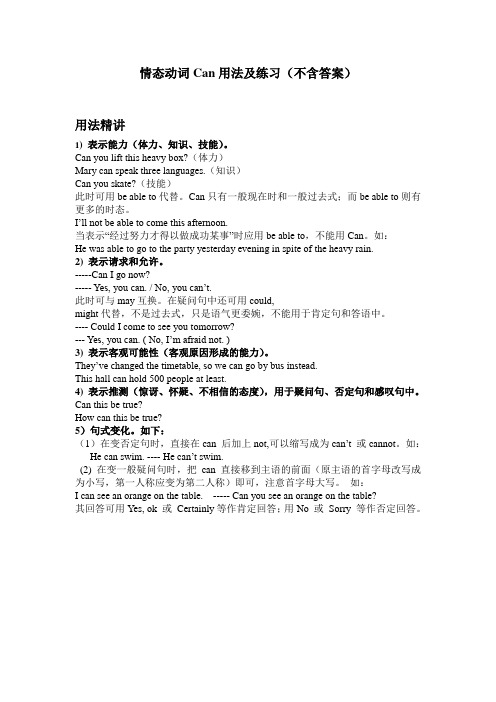
情态动词Can用法及练习(不含答案)用法精讲1) 表示能力(体力、知识、技能)。
Can you lift this heavy box?(体力)Mary can speak three languages.(知识)Can you skate?(技能)此时可用be able to代替。
Can只有一般现在时和一般过去式;而be able to则有更多的时态。
I’ll not be able to come this afternoon.当表示“经过努力才得以做成功某事”时应用be able to,不能用Can。
如:He was able to go to the party yesterday evening in spite of the heavy rain.2) 表示请求和允许。
-----Can I go now?----- Yes, you can. / No, you can’t.此时可与may互换。
在疑问句中还可用could,might代替,不是过去式,只是语气更委婉,不能用于肯定句和答语中。
---- Could I come to see you tomorrow?--- Yes, you can. ( No, I’m afraid not. )3) 表示客观可能性(客观原因形成的能力)。
They’ve changed the timetable, so we can go by bus instead.This hall can hold 500 people at least.4) 表示推测(惊讶、怀疑、不相信的态度),用于疑问句、否定句和感叹句中。
Can this be true?How can this be true?5)句式变化。
如下:(1)在变否定句时,直接在can 后加上not,可以缩写成为can’t 或cannot。
如:He can swim. ---- He can’t swim.(2) 在变一般疑问句时,把can 直接移到主语的前面(原主语的首字母改写成为小写,第一人称应变为第二人称)即可,注意首字母大写。
外研版七年级英语下册Module 2复习情态动词can课件(13张ppt)

You made my day!
我们,还在路上……
B: We_w_a_n_t_ to join the chess_c_l_u_b_. A: Can you_p_l_a_y_ chess ? B: No , I _c_a_n_’t__. 5. She can speak English but she c_a_n_’_t__ speak it very well.
A. and B. but C. or D. so
( B )7.Tom can play the guitar but he _____
play it very well. A. can B. can’t C. not D. don’t
( C )8. ___do you want to join our club?
can can’t
fly high. jump high. swim fast. run fast. climb trees. read and write.
一、补全句子和对话。 1. A: _C_a_n_ you dance? B: Yes, I can. 2. What club does she_w_a_n_t_ to join ? 3. We want to __jo_i_n_ the guitar club. 4. A: What club _d_o_ you want _t_o_join?
Can you dance ? 特殊疑问句:特殊疑问词+ 一般疑问句?
What can you do ?
陈述句:can + 动词原形
Can 无人称 数量变化 一般疑问句:Can+主语+动原…?
Yes,…can. No,…can’t. 否定句:主语+can’t+动原.
初中英语外研版七年级下册Module 2 What can I do知识点
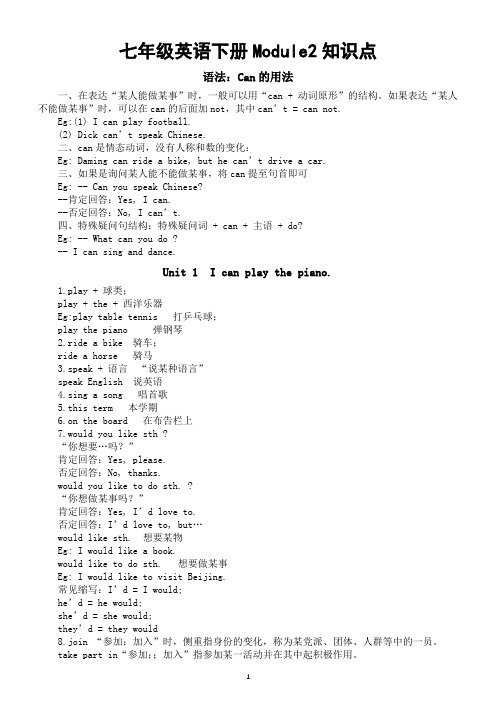
七年级英语下册Module2知识点语法:Can的用法一、在表达“某人能做某事”时,一般可以用“can + 动词原形”的结构。
如果表达“某人不能做某事”时,可以在can的后面加not,其中can’t = can not.Eg:(1) I can play football.(2) Dick can’t speak Chinese.二、can是情态动词,没有人称和数的变化:Eg: Daming can ride a bike, but he can’t drive a car.三、如果是询问某人能不能做某事,将can提至句首即可Eg: -- Can you speak Chinese?--肯定回答:Yes, I can.--否定回答:No, I can’t.四、特殊疑问句结构:特殊疑问词 + can + 主语 + do?Eg: -- What can you do ?-- I can sing and dance.Unit 1 I can play the piano.1.play + 球类;play + the + 西洋乐器Eg:play table tennis 打乒乓球;play the piano 弹钢琴2.ride a bike 骑车;ride a horse 骑马3.speak + 语言“说某种语言”speak English 说英语4.sing a song 唱首歌5.this term 本学期6.on the board 在布告栏上7.would you like sth ?“你想要…吗?”肯定回答:Yes, please.否定回答:No, thanks.would you like to do sth. ?“你想做某事吗?”肯定回答:Yes, I’d love to.否定回答:I’d love to, but…would like sth. 想要某物Eg: I would like a book.would like to do sth. 想要做某事Eg: I would like to visit Beijing.常见缩写:I’d = I would;he’d = he would;she’d = she would;they’d = they wo uld8.join “参加;加入”时,侧重指身份的变化,称为某党派、团体、人群等中的一员。
外研版初一(下)英语 第4讲:Module 2语法篇(学生版)
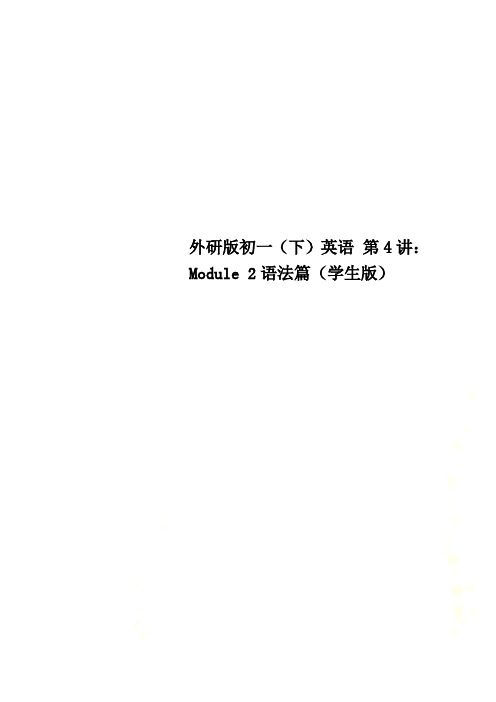
外研版初一(下)英语第4讲:Module 2语法篇(学生版)情态动词can 的用法:情态动词can 后面跟动词原形。
它可以表示能力,译为“能,会”;可以表示怀疑、推测,译为“可能”;表示请求、允许,译为“可以”。
本单元主语集中讲述can 的肯定、否定和疑问形式。
1.表示能力,译为“能,会”。
如:Can you play basketball?2.表示怀疑、推测,译为“可能”,常用于否定句和疑问句中。
如:Lucy can’t be in the room.3.表示请求、允许,译为“可以”,相当于may。
如:You can go now.含有情态动词can 的肯定句变否定句时,直接在它后面加not;肯定句变一般疑问句时,把can提前即可。
见下表:肯定句主语+can+动词原形。
否定句主语+cannot\can’t +动词原形。
一般疑Can+主语+动词原问句形。
?肯定回Yes,主语+can.答No,主语+can\t.否定回答如:My sister can sing.My sister can’t sing.--Can your sister sing?--Yes ,she can.--No ,she can’t.单项选择:1.--What can you do?--I __________ play tennis.A.canB.mayC.mustD.have to2.--Can you play the piano?--No,I __________.But I can play__________violin.A.can,theB.can’t,theC.can,\D.can’t,\3.--Can you ride a horse?--__________.But I will learn to ride it next week.A.Yes,I can.B.No,I can’t.C.Yes,I am.D.No,I’m not.4.--Is that Kate’s car?--It__________be hers.She has just gone for a meeting.A.can’tB.shouldC.mustn’tD.may5.--__________I help you?--Yes.I want a T-shirt.A.CanB.ShouldC.MustD.Would基础演练按要求完成下列句子,没空一词。
七年级英语下册(外研版)Module2语法Grammar情态动词can的用法(含解析)

Module 2 What can you do情态动词can的用法(时间:60分钟,满分:100分)一、单项选择(本大题共50小题,每小题2分,共100分) 1.—Does your sister like ________—Yes, she does. But she ________ swim very well.A.swimming; can B.swim; can C.swimming; can’t D.swim; can 2.—Can your sister play the piano—________. It’s too difficult for her.A.Yes, she does B.Yes, she can C.No, she doesn’t D.No, she can’t 3.—________ Tom play the piano—Yes, very well.A.Can B.May C.Must D.Should4.A good friend is someone you ________ share your pleasure and pain. A.can B.must C.need D.should5.—Emma, ________ you sing a song at the party—Yes, I can.A.may B.must C.need D.can6.—Let’s go dancing tonight (今晚)!—Sorry, I ________. I have to go to my piano lesson.A.mustn’t B.needn’t C.can’t D.couldn’t7.—Jack, could you come to my birthday party tomorrow—Sorry, I ________. I have to look after my grandmother at home. She’s ill. A.won’t B.mustn’t C.couldn’t D.can’t8.—Could I have a look at your new storybook—Sorry, I’m afraid you ________. I am reading it now.A.won’t B.needn’t C.can’t D.shouldn’t9.—Could I have a look at your iPad—________. I am playing a game now.A.Yes, you can B.Sorry, you can’t C.Yes, you could D.No, you couldn’t 10.—What should we do to help the children in poor areas—We ________ collect some books for them.A.need B.needn’t C.can D.can’t11.You ________ come late tomorrow. The plane waits for nobody. A.can’t B.needn’t C.must D.need12.—Can I listen to music here—________, but you can listen in the music room.A.Yes, you can B.No, you ca n’t C.Yes, I do. D.No, I don’t. 13.—Mom, ________ I watch TV this evening—No, you can’t. You must do your homework.A.do B.am C.can D.must14.—Can I go out and play basketball for a while—I’m afraid you ________. Work must come first.A.needn’t B.mustn’t C.shouldn’t D.can’t15.—There is a new art museum in our city. You _______ miss it.—Thank you. I won’t.A.can’t B.must C.needn’t16.—Can you play table tennis—________. But I can play football.A.Yes, I can. B.Yes, I do. C.No, I don’t. D.No, I can’t.17.—________ you help me please, Lingling— Yes, of course.A.Can B.Must C.Need D.Should18.—Can you come to my birthday party—I’d love to, but I ________ come.A.can’t B.do not C.isn’t D.do19.—Can you ride a bike—_________. But I will learn to ride it next month.A.Yes, you can B.No, you can’t C.Yes, I can D.No, I can’t20.Computers ________ process (处理) difficult problems very quickly.A.can B.must C.should D.need21.—Is it hard for you to finish today’s homework yourself—No. I ________ do it.A.need B.may C.must D.can22.—Thomas, where are my postcards I ________ find them.—They’re on the bookshelf.A.can’t B.needn’t C.mustn’t D.shouldn’t23.—Could I feed the bird, mum—Sorry. I’m afraid you ________. The sign over there says, “Please do not feed the b irds.”A.can B.could C.can’t D.couldn’t24.—Can Jane play chess—No, she ________.A.doesn’t B.isn’t C.can’t25.Peter can ________ very well.A.dance B.to dance C.dancing D.dances26.“Can you see my ruler ” “Sorry, ________.”A.I don’t B.I’m not C.I can’t D.I can27.—My brother is 4 years old now. But he help my parents do many things. —Really Great boy!A.can B.need C.must28.—Hello, ________ I help you—Yes, please. I need a basketball.A.Can B.Do C.Am D.Be29.—Tomorrow is Sunday. I ________ go to the farm with you.—We will have a good time.A.mustn’t B.can’t C.must D.can30.—________ you play football—Yes, I can.A.Can B.Must C.Are D.Do31.— Can you find Black Hill on the map, Cindy—________. It’s here!A.Yes, I must B.Yes, I can C.No, I needn’t D.No, I don’t32.—Can you go shopping with me, Jack—Sorry, I ________. I have to play the piano first.A.can’t B.shouldn’t C.mustn’t33.— Can Jimmy play the guitar—No, he ________.A.can’t B.isn’t C.don’t D.doesn’t34.He can ________ Chinese and Japanese.A.say B.says C.speaks D.speak35.To everyone’s surprise, Liu Wei ______ play music on the piano with his toes so fluently.A.can B.may C.should D.must36.—________ I borrow your dictionary, Jason—Yes, of course. Here you are.A.Can B.Must C.Need D.Should37.—Can you see ________ children near the well from your cookhouse—No, I ________.A.a group of; can’t B.a lot of; may not C.a group; can’t D.lot of; may not 38.—Can the girl speak English—________, but only a little.A.Yes, she could B.Yes, she can C.No, she can’t39.—Can I eat these apples—________ Please help yourself.A.Yes, you could. B.No, you couldn’t. C.Of course you can.40.—Can you play table tennis—Yes, I ________.A.can B.must C.may D.should41.—________ we wear hats at school—No, we can’t.A.Can B.Need C.Must D.Do42.Jack ________ sing but he can’t play the guitar.A.will B.may C.can43.—Can you cook—________. I do it for my parents every day.A.Yes, I can B.No, I can’t C.Yes, I will D.No, I won’t44.I have my own room in my house, so I ________ do what I want in it.A.can B.can’t C.might D.might not45.We can eat in the restaurant(餐馆). But we ________ eat anything in the classroom.A.can’t B.don’t C.aren’t D.didn’t46.Mr. Black ________ play the piano and he can also play ________ basketball. A.can; the B.can’t; / C.can’t; the D.can; /47.—Can you play the piano—Yes, I ________, and I’m good at it.A.may B.can C.need48.English is too difficult. I ________ learn it well.A.can B.doesn’t C.am not D.can’t49.—Who is knocking on the door Is it your brother—It ______ be him, Mom. He’s still at work.A.can’t B.can C.must D.mustn’t50.— ________ your brother speak Japanese— Yes, he speaks it very well.A.Should B.Must C.Can D.May参考答案:1.C【详解】句意:——你的妹妹喜欢游泳吗?——是的,她喜欢。
Grammar七年级英语下册——情态动词can的用法
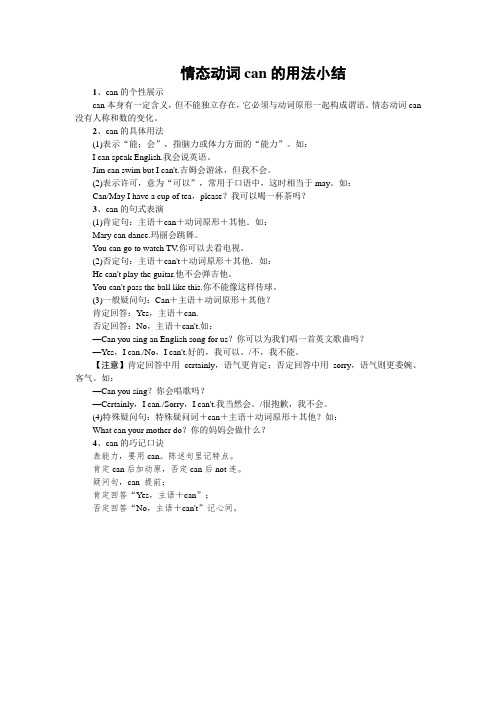
情态动词can的用法小结1、can的个性展示can本身有一定含义,但不能独立存在,它必须与动词原形一起构成谓语。
情态动词can 没有人称和数的变化。
2、can的具体用法(1)表示“能;会”,指脑力或体力方面的“能力”。
如:I can speak English.我会说英语。
Jim can swim but I can't.吉姆会游泳,但我不会。
(2)表示许可,意为“可以”,常用于口语中,这时相当于may。
如:Can/May I have a cup of tea,please?我可以喝一杯茶吗?3、can的句式表演(1)肯定句:主语+can+动词原形+其他.如:Mary can dance.玛丽会跳舞。
You can go to watch TV.你可以去看电视。
(2)否定句:主语+can't+动词原形+其他.如:He can't play the guitar.他不会弹吉他。
You can't pass the ball like this.你不能像这样传球。
(3)一般疑问句:Can+主语+动词原形+其他?肯定回答:Yes,主语+can.否定回答:No,主语+can't.如:—Can you sing an English song for us?你可以为我们唱一首英文歌曲吗?—Yes,I can./No,I can't.好的,我可以。
/不,我不能。
【注意】肯定回答中用certainly,语气更肯定;否定回答中用sorry,语气则更委婉、客气。
如:—Can you sing?你会唱歌吗?—Certainly,I can./Sorry,I can't.我当然会。
/很抱歉,我不会。
(4)特殊疑问句:特殊疑问词+can+主语+动词原形+其他?如:What can your mother do?你的妈妈会做什么?4、can的巧记口诀表能力,要用can。
外研版英语七年级下册Module 2 【易混辨析】:can和could的用法及区别

【易混辨析】:can和could的用法及区别表示能力:能,能够,会He could swim when he was five. 他五岁时就会游泳了。
Can you drive a car? 你会开车吗?—Yes, I can. 我会。
—No, I can’t. 我不会。
表示推测:可能,会I think the work can be completed ahead of time. 我认为这项工作能提前完成。
What can he mean? 他会是什么意思?注:表示推测时,could不是过去式,只是语气更委婉;若是推测已发生的事或过去的情况,用can/could have加过去分词。
如:Today is Sunday. He can’t/couldn’t be at school. 今天是星期天。
他不可能在学校里。
Mike can’t have found his car, for he came to work by bus this morning. 迈克一定还没有找回他的车,因为早上他是坐公共汽车来上班的。
表示“有时也会”It can be quite windy there, especially in spring. 那里有时容易刮风, 特别在春季。
表示允许:可以(口语中常代替may)You can first lend me one book this time. 这次你可以先借给我一本书。
You can’t take the book out of the room. 你不可以将这本书拿出室外。
注意:1. 表示允许别人做某事只能用can,不能用could。
2. can’t 和mustn’t 一样,都可表示“不准,不允许”。
表示请求:可以Can I go swimming today, please, mum? 妈妈,我今天可以去游泳吗?Could you tell me how I can get to the railway station? 请告诉我去火车站怎么走吗?注意:could不是过去式,只是语气较can更委婉,注意在回答中不可用could。
- 1、下载文档前请自行甄别文档内容的完整性,平台不提供额外的编辑、内容补充、找答案等附加服务。
- 2、"仅部分预览"的文档,不可在线预览部分如存在完整性等问题,可反馈申请退款(可完整预览的文档不适用该条件!)。
- 3、如文档侵犯您的权益,请联系客服反馈,我们会尽快为您处理(人工客服工作时间:9:00-18:30)。
名师总结:情态动词can的用法1. (表示能力、功能)能,会
The classroom can seat thirty students.
这教室能坐三十位学生。
June can drive now.
琼现在会开车了。
2. (表示可能性)可能,可能会
I think the work can be completed ahead of time.
我认为这项工作能提前完成。
3. (表示允许、请求)可以
You can't take the book out of the room.
你不可以将这本书拿出室外。
Can I use your pen?
我可以用一下你的笔吗?
4. (表示命令)必须
If you won't keep quiet you can get out.
你如不保持安静,就请你走。
5. (表示偶然发生的可能性)有时会
It can be quite windy there, especially in spring.
那里有时容易刮风,特别在春季。
6. (表示惊讶)究竟;竟至于
What can it possibly be?
到底那是怎么一回事?。
